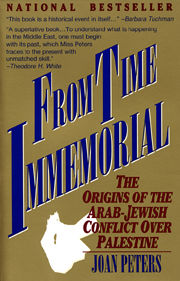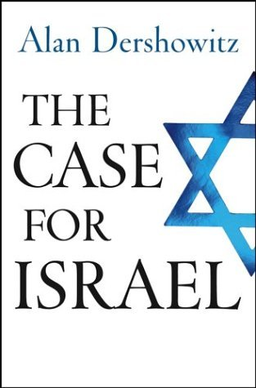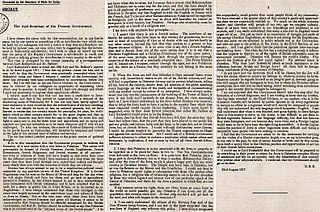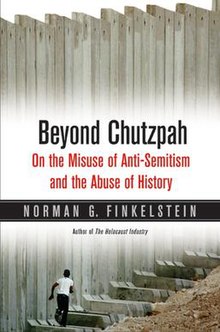The Dershowitz–Finkelstein affair was a public controversy involving academics Alan Dershowitz and Norman Finkelstein and their scholarship on the Israeli–Palestinian conflict in 2005.

From Time Immemorial: The Origins of the Arab–Jewish Conflict over Palestine is a 1984 book by Joan Peters, published by Harper & Row, about the demographics of the Arab population of Palestine and of the Jewish population of the Arab world before and after the formation of the State of Israel.

The Case for Israel is a 2003 book by Alan Dershowitz, a law professor at Harvard University. The work is a response to common criticisms of Israel. The Case for Israel was a New York Times bestseller.
New antisemitism is the concept that a new form of antisemitism developed in the late 20th and early 21st centuries, typically manifesting itself as anti-Zionism. The concept is included in some definitions of antisemitism, such as the working definition of antisemitism and the 3D test of antisemitism. The concept dates to the early 1970s.

Greater Israel is an expression with several different biblical and political meanings over time. It is often used, in an irredentist fashion, to refer to the historic or desired borders of Israel.

Image and Reality of the Israel–Palestine Conflict is a 1995 book about the Israeli–Palestinian conflict by Norman G. Finkelstein. Finkelstein examines and scrutinizes popular historical versions of the conflict by authors such as Joan Peters, Benny Morris, Anita Shapira and Abba Eban. The text draws upon Finkelstein's doctoral political science work. The 2003 revised edition offers an additional appendix devoted to criticism of Michael Oren's 2002 bestseller Six Days of War: June 1967 and the Making of the Modern Middle East.

Alan Morton Dershowitz is an American lawyer and law professor known for his work in U.S. constitutional law and American criminal law. From 1964 to 2013, he taught at Harvard Law School, where he was appointed as the Felix Frankfurter Professor of Law in 1993. Dershowitz is a regular media contributor, political commentator, and legal analyst.

Joseph Andoni Massad is a Jordanian academic specializing in Middle Eastern studies, who serves as Professor of Modern Arab Politics and Intellectual History in the Department of Middle Eastern, South Asian, and African Studies at Columbia University. His academic work has focused on Palestinian, Jordanian, and Israeli nationalism.
The Case for Peace: How The Arab–Israeli Conflict Can Be Resolved is a 2005 book by Alan Dershowitz and follow-up to his 2003 book The Case for Israel.

"A land without a people for a people without a land" is a widely cited phrase associated with the movement to establish a Jewish homeland in Palestine during the 19th and 20th centuries. Its historicity and significance are a matter of contention.
This is an incomplete bibliography of the Arab–Israeli conflict.

Norman Gary Finkelstein is an American political scientist and activist. His primary fields of research are the politics of the Holocaust and the Israeli–Palestinian conflict.

Anti-Zionism is opposition to Zionism. Although anti-Zionism is a heterogeneous phenomenon, all its proponents agree that the creation of the modern State of Israel, and the movement to create a sovereign Jewish state in the region of Palestine—a region partly coinciding with the biblical Land of Israel—was flawed or unjust in some way.
In 1978 Sami Esmail, a 24-year-old American citizen of Palestinian descent, was prosecuted in Israel for membership in the Popular Front for the Liberation of Palestine. The case generated a great deal of interest in the US, especially in the Arab American community and at Michigan State University, where Esmail was an Electrical Engineering graduate student.

Racism in the Palestinian territories encompasses all forms and manifestations of racism experienced in the Palestinian Territories, of the West Bank, Gaza, and East Jerusalem, irrespective of the religion, colour, creed, or ethnic origin of the perpetrator and victim, or their citizenship, residency, or visitor status. It may refer to Jewish settler attitudes regarding Palestinians as well as Palestinian attitudes to Jews and the settlement enterprise undertaken in their name.

Criticism of Israel is a subject of journalistic and scholarly commentary and research within the scope of international relations theory, expressed in terms of political science. Israel has faced international criticism since its establishment in 1948 relating to a variety of issues, many of which are centered around human rights violations in its occupation of the West Bank and the Gaza Strip.
Operation Atlas was the code name for an operation carried out by a special commando unit of the Waffen SS which took place in October 1944. It involved five soldiers: three who were previously members of the Templer religious sect in Mandatory Palestine, and two Palestinian Arabs who were close collaborators of the mufti of Jerusalem, Amin al-Husseini.
This timeline of anti-Zionism chronicles the history of anti-Zionism, including events in the history of anti-Zionist thought.

Since the Israeli Declaration of Independence in 1948, a number of countries and individuals have challenged the country's political legitimacy. Under international law, Israel has always met the standards for recognition as a sovereign state. However, over the course of the Arab–Israeli conflict, the country's authority has been questioned on a number of fronts. Critics of Israel may be motivated by their opposition to the country's right to exist or, since the 1967 Arab–Israeli War, their disapproval of the established power structure within the Israeli-occupied territories. Some have called for Israel's destruction.
The exploitation of accusations of antisemitism for political purposes, especially to counter anti-Zionism and criticism of Israel, may be described variously as weaponization of antisemitism, instrumentalization of antisemitism, or playing the antisemitism card. Such accusations have been criticized as a form of smear tactics. Some writers have compared this to playing the race card.












